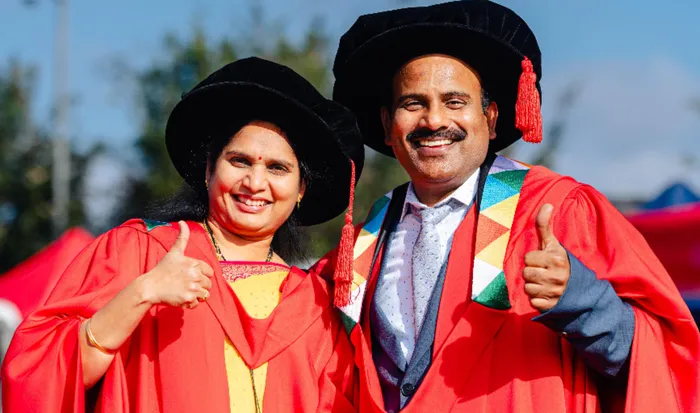Married couple celebrates double PhD graduation at UKZN
A shared journey to PhD success

Drs Ramesh and Kavita Behara
Image: Siphosethu Dlamini
SHARED joy and accomplishment marked the momentous double graduation of married couple Dr Ramesh Kumar Behara and Dr Kavita Behara, who both earned their PhDs in Engineering at the University of KwaZulu-Natal’s (UKZN) Spring Graduation Ceremony on Thursday.
The couple graduated from the College of Agriculture, Engineering and Science – Ramesh in electrical engineering and Kavita in computer engineering.
After 23 years of marriage, the Beharas stood side by side on the graduation stage, not just as life partners but as academic peers who had weathered the rigours of doctoral study together.
“It feels truly special to be graduating together,” said Ramesh.
“This milestone is more than personal success; it reflects our shared journey, the challenges we’ve overcome and the inspiration we’ve drawn from one another.”
Kavita said: “Graduating alongside my husband makes this achievement even more meaningful. We’ve supported each other through the challenges and celebrated the milestones along the way. Sharing this moment together feels like a double victory.”
Ramesh’s PhD, supervised by Professor Akshay Saha, focused on renewable energy systems.
His thesis, titled: “Optimised Hybrid Models for Grid-Integrated DFIG Wind Power Generation”, developed an optimised hybrid model to address the challenges in integrating data augmentation, fault diagnosis and predictive control models tailored for grid-connected DFIG wind energy systems under dynamic wind conditions.
His research demonstrated the viability of deploying end-to-end hybrid models in real-time wind farm applications, ensuring fault tolerance, predictive adaptability and enhanced grid stability.
Explaining the significance of his research, Ramesh said: “My work supports the global transition to cleaner energy by enabling smarter, more reliable and more sustainable use of wind power within modern power grids.”
With over 35 years of professional experience, he plans to further contribute to renewable energy innovation, combining artificial intelligence (AI) with clean technology solutions.
Kavita’s research, supervised by Dr Ernest Bhero and Professor John Agee, tackled a completely different but equally impactful challenge, namely, healthcare access.
Her thesis, “Optimising Deep Learning Algorithms for Improved Skin Cancer Classification and Detection”, introduced AI-based hybrid innovative models that significantly advanced diagnostic accuracy, interpretability and inclusivity in melanoma care.
“I developed a computer system that can analyse images of skin lesions to help doctors decide whether they’re likely cancerous,” Kavita explained.
“This matters because early detection greatly improves survival rates, especially in communities with limited access to dermatologists.”
Her work, described as a pioneering contribution to medical AI, not only enhances skin cancer diagnostics but also champions fairness and trust in healthcare technologies.
“The significance lies in its potential to save lives,” she said. “My research shows how technology can support – not replace – doctors, helping them reach more patients in need.”
Beyond their academic partnership, the Beharas are proud parents to two children, Shriya and Shreyansh, both currently pursuing MBChB degrees at the University of the Witwatersrand (Wits)
“This journey serves as an inspiration for our children to stay updated with technology and continually grow their skills to support society,” said Ramesh.
Kavita added: “My husband has been my greatest source of strength. His encouragement made the journey lighter and more rewarding. Our children’s love and patience inspired me to keep going.”
Now that they’ve crossed the PhD finish line, both Ramesh and Kavita are focused on future contributions to their fields, to students and to society.
“I plan to apply AI to optimise clean technologies and contribute to industry and academia,” Ramesh said.
“Mentoring the next generation of energy professionals is equally important to me.”
Kavita’s goals lie at the intersection of AI and healthcare.
“I want to continue developing practical solutions that can be implemented in real-world clinical settings, and also mentor aspiring researchers in this field. I feel blessed to have shared this journey with my husband. It made the challenges easier and the successes so much sweeter,” said Kavita.